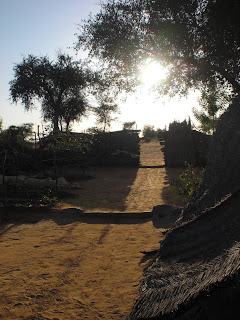
My one year anniversary here in Niger arrived without much preparation and seemed to disappear just as subtly. It got me thinking about movements of time and our perceptions of those movements, and what a day is versus an hour, a year, etc., etc. At home, in the states, each day seems to be filled up with all of these details and events, and by the end of the day one can say, rather easily, what he has accomplished (or at least what he has done). There is, perhaps, a sense of action in each American day. I am not disputing that here in Niger we don’t also do things with our days; I would like to assert, however, that the cyclical movement of hours turning into night and then day and then night and then day seems to move much more fluidly. Recently I fear time is traipsing so quickly and seamlessly that I will wake up one morning to discover I am an old, old woman and still with so much to see of the world.
I have a meeting planned with the English teachers at my school next week to start a club d’anglais. I’m excited to get connected with the actual students at the CEG. I think interacting with kids instead of bureaucracy will be a good, fresh change. Insha’allah. A couple weeks after that I will be having a meeting with the COGES, the faculty, and (I’m hoping) some portion of the village community to run a PACA (Participatory Analysis for Community Action). In these meetings the PCV sort of sits on the sidelines/lightly facilitates while the community uses an image-based system of creating a list of needs and voting on the most pertinent one to bring to action. In a positive light PACA is an innovative and illiterate-friendly forum in which a community can articulate as a team their most pressing need, and then work to eliminate/alleviate that need using their volunteer as the missing link/resource. In a less positive light it can be seen as a forum for voting on a ‘big money project’ which the volunteer can dump on the community without much hope for sustainability. I am hoping that if we go ahead with PACA in Kiota the result will lead toward the former. Regardless, if all goes as planned, I will end up asking an economically crisis-ing America for money to fund the project.

Our sister stage (the group of Ag/NRM volunteers who came a year ahead of us, and helped train us during PST) is currently in Niamey having their COS (close of service) conference. I cannot believe that this group of people will be leaving in less than two months. Once they leave we are the next set of Ag/NRMs to COS. I’m starting to feel like there just isn’t time in two years to do anything. Or rather, any amount of time learns how to eat itself up until suddenly it is diminishing and all of the tasks allotted to it have been pushed to the back. I suppose people probably exist who live differently than that: people who end up with their tasks completed and the extra time laying out ahead of them. I have not learned to be one of them.
I have harvested my millet, my hibiscus, my beans and my peanuts. My moringa trees are getting taller and providing me with delicious kopto to add to my lunches. My cat is getting bigger and crazier everyday. I’ve been reading great books and appreciating that after Peace Corps I will never again have this kind of time to read for pleasure. I am trying to figure out what to do with the rest of my life. But I presume we’re all doing that. Miss you all and would love to hear from you. Much, much love, Annette.





















































